Dev Friedlander's Blog, page 2
August 22, 2020
Food Color Challenge
My previous summers were usually filled with spontaneous day trips, large family BBQ's and lounging at the pool. Thanks to Covid-19, now I take meticulously planned day trips, have small spaced out family picnics and there is hardly any lounging, even at the pool.
To bring some spice to what has been an unavoidably monotonous summer, I decided to dare my daughters into taking “the food color challenge.” The concept is simple. Pick a color and eat any food that matches (more or less) for an entire day. We agreed upon a three-day challenge, selected the colors green, red and white and got to work making meal plans.

Day one: Green
Menu: spinach and broccoli quiche, green salad, green apples, cucumbers, and a celery and pear smoothie.
We picked green because we thought there would be many foods to choose from. We thought wrong. An hour after lunch my girls began to complain of hunger and I felt their pain, my own stomach screaming at me to find something more filling. While we have never eaten so many healthy vegetables in one day, I’d say that eating my greens can be painful without a good, solid protein. The day ended with groans and moans, and I was worried that the girls would quit the challenge.
Day two: Red
Menu: berry smoothie, tomato salad, red peppers, red apples, and a red bean and meat tomato mixture.
I greeted my girls with a berry breakfast smoothie and asked if they wanted to continue the challenge. They said, “definitely.”
So, I made them a tomato sauce with added meat and kidney beans for lunch. Red tends to be a color that packs more nutrients into foods, so I hoped we wouldn’t be as hungry as the day before. To my surprise they downed plates full of meat sauce, never once complaining about the beans. My youngest even made me cut her some red peppers as a snack, because, “it’s a color she can eat.” We went to bed satisfied, and our stomachs full. Still there were some complaints that they wanted to eat something delicious, which they felt they were deprived of on the first two days.
Day Three: White
Menu: Egg whites, onions, yogurt, butter, roasted cauliflower, pita bread, popcorn, pancakes, and white ice cream.
While white foods may not be the healthiest, they most certainly are delicious. The day started with pancakes with white chocolate chips for the kids and roasted cauliflower and egg whites for me. I must admit that the ice cream did continue a small about of dark chocolate and I did add a few almonds to my yogurt, but other than that we keep to our color scheme. The girls were happier than green day, though not as full as red day. And I enjoyed every little kernel of popcorn leftover from snack time. No one wanted to continue the challenge, but we were all proud that we had completed three days of eating (mostly) one color.
All in all, I am glad I accepted this challenge. It gave the kids a love for foods they would have never tried if there hadn’t been a competition. They also turned down candy because, and I quote, “it wasn’t a color of a food I can eat.”
We all agreed that white was our favorite day, who doesn’t love pancakes, popcorn, and ice cream? We found red day the most filling, and green day was unanimously voted the toughest, as well as the least tasty. But nothing was as satisfying as sticking my fork into a medley of food the next day.
I have learned from this food color challenge three things. That food can be fun in many colors; that my kids do enjoy quiche, kidney beans and celery filled smoothies. And most importantly, that the most delicious plate of food is a diverse one.





July 19, 2020
Vital Fluids
Recently I did something I’ve never done before; I donated blood. For years I’ve been scared to roll up my sleeve and offer up my vein, thinking it would be extremely painful and as a result, I would never want to go near needles again. The process was painful and somewhat tiring; but I’m referring to the paperwork, not the donation.
When I first arrived at the donation center I was asked, in Hebrew, if I had a temperature, which is the standard Corona era question we have all become accustomed to answering before entering a public facility. I understood the question, but my nervousness sent any Hebrew vocabulary I possessed right out of my brain. I declared right then and there that I would be speaking only in English.
A young woman was assigned to translate the registration forms for me. And so we began…
“Do you smoke?”
“No.”
“Have you taken any medication, including Tylenol?”
“Maybe.”
“Have you been out of the country, recently?”
“No,” but I really, really want to travel.
“Do you have a heat-related health condition?”
It’s summer, of course, I have a heat condition!

Then I was told I couldn’t donate blood. Not because of the possible Tylenol digestion or heat condition, but because somehow my blood pressure was 93/70…too low. They said they would give me five minutes to raise my systolic number. Once it was at least 100, they would accept me. Challenge accepted.
Google had plenty to say about how to lower blood pressure; almost like it didn’t believe someone would want to raise the numbers on the Sphygmomanometer. I had to ask Google three times to get my question answered. Finally, I found these tips: Drink water, eat something salty, avoid alcohol, get my thyroid checked.
Out of these four options, I had only one which was immediately available, to drink lots of water. I gulped down about a half-liter of water and then, to be safe, I thought of the most stressful situations I could imagine, like being in rush hour traffic on my way home from Ulpan.
When I was certain I was hydrated and stressed, I sat back down at the registration table. They placed the cuff around my bicep and pronounced, “103/70.” I beamed, having finally found a good use for my anxiety. I was taken in and placed on a gurney. My heart began to thump, my fear of pain kicking into overdrive. I began to get cold feet, thinking this was a bad idea, a terrible idea. The volunteer held my hand, and with one small pinch, the needle was in.
“That was it?!” I wanted to cry tears of joy. I’ve had eyebrow plucking experiences which were far more painful.
With the worst over, I relaxed and enjoying the soothing playlist I had created for the occasion. But about five minutes in, I did begin to feel pain. Not from the needle, but from the tourniquet. I waved at the volunteer and motioned for her to loosen the band around my arm. She did and then there was absolutely no pain; I could’ve been laying in my bed at home, that’s how comfortable I felt.
Ten minutes later, I was told to get up, slowly...oh, and to eat a cookie. Feeling slightly woozy, I made my way to the table that had lots of different treats to choose from. I chose a cookie with powdered sugar, sat down, and took a bite. Instantly the dizziness went away. So, I ate another cookie, just to be sure.
Then a guy with a camera came around. He took a picture of me, then another and another. I was so flattered, maybe my inner glow was shining through. I straightened my shoulders, waiting for the next photo to be taken when I suddenly heard clapping.
The vice-mayor stepped into the room from the doors behind me, bodyguards at his side. I laughed, realizing that none of those pictures were of me, only the celebrity behind me. I finished my second cookie, took the free hat that I was offered, and went out to where my husband was waiting for me in the parking lot.
The joy I felt was immeasurable. Not only had I overcome a childhood fear of needles, but I had also taken a small part in saving a life. If you are thinking of donating blood, but are afraid it will hurt, I can assure you, it won’t be as bad as you may imagine! But the paperwork might be painful.
July 12, 2020
Watching Your Children Grieve
As a parent, I naturally prefer to shield my children from pain; and when my girls were young it was easy to keep the cruel world locked firmly out. But as they grew older, it became harder. Whether it was a skinned elbow from a fall, the tears from a mean schoolyard bully, or the sorrow that comes from losing someone special; pain is another part of life we learn to adapt to. Recently it became, even more, a part of our lives.
A few weeks ago, our family lost someone incredibly special to us, my husband’s father, and my daughter’s grandfather, whom we affectionately called “Duna.” Duna, which comes from the word “Chief” in Zulu, wasn’t a typical name for a grandfather, which was one of the reasons we loved him. He chose it for himself, feeling the name Grandpa, Saba, or Papa would age him prematurely.
Instead of candy, he gave good advice. Instead of simply a good time, he showed us a different perspective. He always played fair but never let us win, making the (seldom) victory even sweeter. Duna was a fighter, plain and simple, fighting a debilitating disease called Erdheim Chester for over ten years. Unfortunately, on June 26 he lost his fight quite suddenly.

With oven mitts on my hands and my brow sweaty from cooking, I received the news that our beloved Duna was gone. It was 10:30 am. I was informed there would be a funeral in just three short hours. In Israel, they strive to bury the body as soon as possible so the deceased’s soul can begin its ascent to heaven without delay. I was in the thick of Shabbat food preparations and now I was running up against a shortened deadline. I raced around my apartment like a dog searching for its tail. I had to finish making the challah, walk the real dogs which we were dog-sitting for my in-laws, get ready for a funeral and somehow tell my daughter’s the sad news. Having too much energy to burn and not enough mental energy to focus, I harnessed my in-law’s dogs and headed down to the school to pick up my girls.
People passed me with cheery faces, asking me how I was. I told them the truth, that I was far from okay and related the news of my father-in-law’s passing. Unfortunately, that’s how my daughters found out, from me repeating the news to friends.
Back at home, while I was running around the house looking for a funeral dress, my eldest made lunch for her two younger sisters, but when she called out that “the food is ready,” neither of them came to the table. I went to their room to see what was happening.
My youngest had her headphones on, lost in a TV show, and my middle daughter was curled up in her bed crying. I pulled back the covers and held her, tears staining my own cheeks. I asked her if she wanted to go to the funeral. She said, “no.” I asked if she wanted a friend. She said, “yes.” Minutes later, there was a knock on the door, and my daughter’s tears began to dry. Pulling the headphones away from my youngest’s ears, I asked what she wanted to do. Her response? “I want to finish the episode.”
When my husband arrived home to collect the family, the middle and youngest didn’t wish to go. My oldest, who was sweeping the kitchen at the time, stoically stuck out her chin and said, “I’ll take care of my sisters.”
The next week, their grieving patterns stayed the same. My oldest helped around the house, my middle spent time with friends and my youngest distracted herself with as much screen time as we would allow. This led me to conclude that grief, even in children, is as individual as their thumbprints.
I can’t say whether I handled things the “right way.” Perhaps I should have hurried the girls home instead of sharing the news with friends first or stayed behind with my children instead of attending the funeral. Or maybe it was a tough time and I handled it the best I could.
Grief is not an easy emotion to handle. I think the pain we feel from the loss is the same. What's different is how that pain is expressed, as evidenced by the three different reactions I saw in my daughters. I feel it is important to allow others the freedom to grieve in their own way, even children. And while there is no clear-cut remedy for the pain of grief that suits everyone, I have learned that compassion, love, and understanding can go a long, long way.
June 20, 2020
A Time to Listen
I decided many years ago that I would do my best to keep my writing as far away from politics as possible. I want my readers to see themselves in my words, and that cannot be achieved if I add too much of my opinion. Yet, there are certain worldwide events that go beyond politics. And while I know that I must not remain silent, what can I say?
Any words I utter could be inflammatory. Someone may take offense and that is when it occurred to me, not to speak at all, but to listen. Therefore, I am letting my friend tell her story here about what it is like to be biracial in the Jewish community. She has asked to remain anonymous and I am honoring that request.
These are my friend’s words; this is her story. All I ask is that we listen...
My father is Caucasian. My mother is African American. They met in a high school in Laguna Beach, CA where they feel in-love. My father’s parents weren’t pleased about their son’s relations with a black woman and they kept their distance until my brother and I were born.
Sharing the hippy philosophy that “love should be free,” my mother and father took off to another state over 2,000 miles away. The rest, as they say, is history. My mother never really felt accepted by my paternal grandparents, a sort of coldish peace was reached between them.
I was taught to never judge based on race. And believe me, I’ve lived in extreme worlds. From visiting yacht and tennis clubs with my well-to-do grandparents to playing at the Harriet Tubman medical office after school where my mom worked, which was owned by a family friend and former black panther members.
History repeated itself when I met my husband. At first, my husband’s parents kept their distance. But after I converted a few years later, at the age of 25, things improved. Now I love my in-laws as if they are my own flesh and blood and they feel the same about me.
Later, my husband and our three children moved to Israel. For the most part, I feel very accepted in Israel by my fellow Jews. Nothing like the experiences I had experienced previously at Synagogues in the States.
My most negative experiences were when I taught in Orthodox Jewish schools. There were a few incidents where the students made funny comments about black people and African American history.
Adding salt to the wound, my boss, and a very good friend, was not very empathetic when I addressed the issue with her. I was appalled by some of the student’s comments and felt it was my duty as an educator to help improve this area, especially amongst the more religious communities. I felt misconceptions and hurtful comments stemmed from the lack of exposure to other cultures and races, which can be missing in the Jewish Day School system.

My experiences in Israel have been far more positive, which my mom, agrees. Strangers would try to speak with her in Hebrew, mistaking her for a local, not realizing she was a visitor from the States. There is far more diversity within the communities, helping to combat the stereotypes and negative perceptions. Not that it is perfect, as anything, there is always room for improvement.
The current outrage felt in the African American community is justifiable. There’s not one black person that I know who hasn’t had experiences with racism. Some are worse than others but nevertheless, racism is absolutely a (big) problem.
If I’m being honest, I’m not as in touch with that part of myself as I once was. Once I became Jewish that became my main identity. Although, I absolutely support the Black Lives Matters movement. Obviously not the sector that’s anti-Israel. I would like to see things change! I would like to know that my family members back in America are safe. That they don’t have to school their black sons on how not to get shot if they are ever pulled over by the police.
I would love to see all the unexplainable deaths of black people by the police come to an end once and for all. I’d love to see some of the laws changed that are designed to keep black youth in the system. It’s like a never-ending cycle and I believe that minorities need all the help that they can get from people in power to address these problems within the black community.
I do not by any means support the looting or destruction happening, just the peaceful rioting (I prefer the word riots over protesting) I think the rioting is actually beautiful. To see so many people from different backgrounds coming together and fighting for the same cause.
To be clear, Jewish people are the most amazing people that I’ve ever known! So many good values which gave me a longing to convert. Everyone is so close-knit, and there is truly a sense of community, like family. It gives me a sense of security and pride, and I think it should be an example for the world to follow.
That being said, there’s definitely room for improvement when it comes to empathizing with POC (people of color). I have not personally seen flat out racism here in Israel, but I have heard some cringe-worthy comments directed at or about black people and Asians.
These problems have to be addressed. Some are so obvious that it almost makes it worse that they haven’t been dealt with. Yet at the same time, I hope that since these problems are now getting the attention they deserve, it will also bring about the changes we have been longing for.
June 13, 2020
Interview with R.C Hand – Writer and Travel Enthusiast
One of the great joys about being a writer is sharing my work with others. This week I am sharing my blog with a fellow writer and world traveler, R. C Hand. He has journeyed to nearly 100 countries, on seven continents along with his wife, with Israel being one of those destinations. It is always fascinating to me how people from other countries view my homeland. I was honored that R.C was willing to share his insights with me about his life and his visit to the Holy Land.
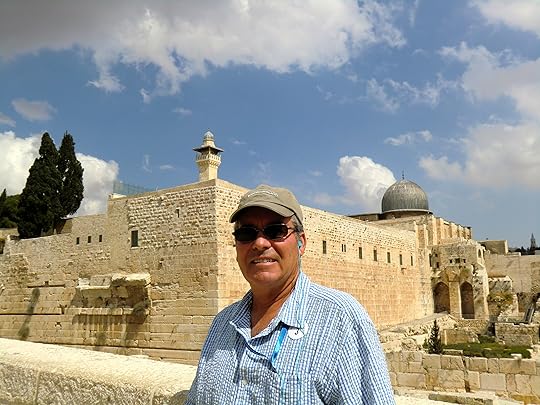
,R.C. Hand is a retired contractor who has become an avid world traveler. He grew up in Orange County, California where he still resides when he’s not traveling. At an early age, he worked alongside his father as a plasterer, then at twenty-seven, he took over his family’s contracting business. R.C is also an avid writer, with a travel blog and several published novels including: “The Adventures of the Smith Family,” “Sailing Away,” and “Grandpa Ernie’s Secrets.” R.C uses his passion for human plight by listening to the stories of people around the globe and sharing those experiences.
,R.C, you have been to almost 100 countries, how do you choose where to travel next? ,,We choose our destinations in many ways. We might see an article in the travel section of the paper, or we might have read a travel book or novel.
,Among your destinations was Israel, can you tell me why you chose to visit there? ,,My wife wanted me to see Israel due to her culture and my interest in religion and history. We are not religious, but I understand the importance of religion to the existence of democracy and western culture.
,Most people travel to Israel because they feel an attachment to the religious sites, to see the natural wonders of the land and unique buildings and architecture. Did any of these reasons draw you to the country, or was it something else? ,,My wife of thirty-seven years is a non-practicing Jew. She visited Israel after finishing high school and it has held a special place in her heart. She wanted to share that magic with me. I enjoyed Israel very much as it is full of history and mystery. I was unsettled though by the tensions among the Jews and the Muslims. ,I find it ridiculous that two groups of people that have so much in common can be so unkind to each other. They believe in the same things for the most part as far as I can tell. I guess it is like the Cain and Abel story.
,Did you get to spend time at the beach? ,I live in a small craft harbor across the street from the beach, so we have little need to spend time at the beach when we travel.
,Was the cuisine like the other middle eastern countries you have visited? Did you eat falafel? ,I am fortunate in that I am an adventurous eater and enjoy all food items. I have managed to not become obese, but I could lose a few pounds. Yes, I love falafel, but gefilte fish is my favorite food item from my wife’s culture.
,In your book “,Sailing Away,” ,you speak about a young Englishman who travels to many ports on the Mediterranean coast. Did you visit most of the places you wrote about? ,,I have been to nearly one hundred countries and to most of the ports in "Sailing Away." I love sea stories and Mark Twain. We did a Mediterranean cruise a few years back and were supposed to go to Egypt but it was at the time that the Muslim Brotherhood came to the forefront and it became more dangerous than usual, especially for a Jew, like my wife. That part of the cruise was canceled and so we spent more time in other ports.
,If you ever come back to Israel for another visit, which place(s) would you return to and want to spend more time at? , We are more interested in museums, art galleries and talking with the locals. I tend to make friends quickly everywhere we go have a great time visiting with strangers (to my wife's slight displeasure sometimes). I enjoyed Masada and had read "The Dead Sea Scrolls Conspiracy." The desert is a beautiful and special place. We went to many of the religious sites as tourists do and I found them very interesting, even though I do not practice myself.
,How do you think the travel industry will recover from the coronavirus? ,,We will survive the virus as we survive most things.
,Where do you plan to travel next? ,,We are off to Egypt next year to Alexandrea and for the cruise on the Nile. They are looking for Alexander's grave in Alexandrea and I hope to see the sites.
,To find out more about R. C travels and adventures, visit his website at
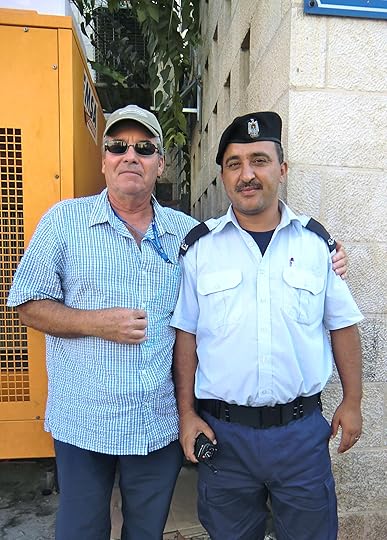
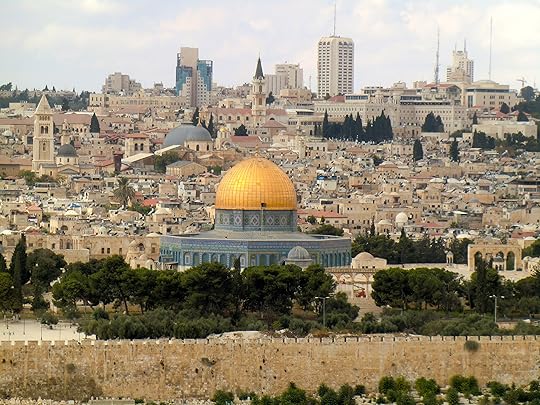
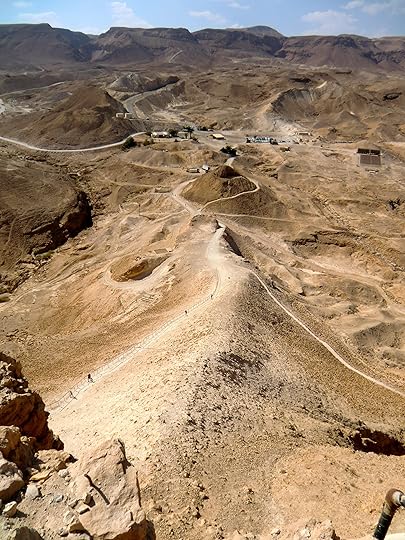
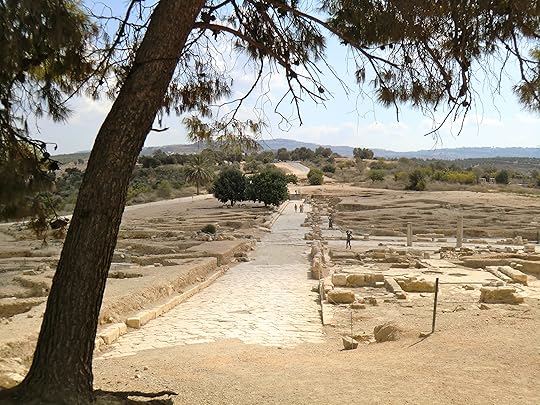

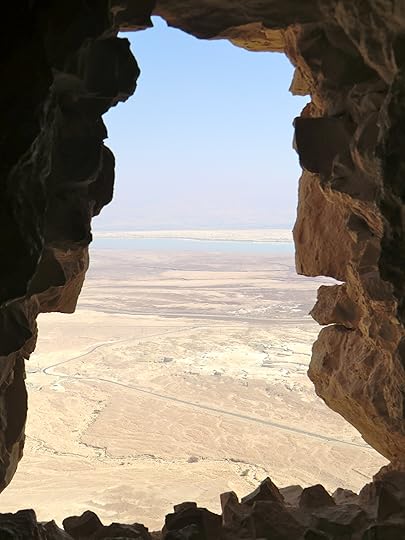
May 31, 2020
Breaking Open
I have done my best to stay positive. I kept a blithe attitude towards the isolation, the mask-wearing, and the many, many Zoom meetings. I have done my best to put on my happy face, roll up my sleeves, and fight my daily battles. But lately, that smile has been hard-won, because the truth is, the struggle exhausted me, and I gave in to the darkness.
This time I was triggered by the news of the passing of a dear relative, my husband’s grandmother, who had lost her short fight with cancer. The sadness I felt from her passing, along with a recent writing submission rejection, suffocating temperatures, and whisperings that there might be a “second wave” of Covid-19 set in motion my emotional crumbling.
It was a couple of weeks ago, while cooking for Shabbat, that these feelings of sadness and anxiety overwhelmed me to the point that I could no longer stand. I left the food simmering in the pot, I left the laundry in the machine, I ignored the texts from friends and even my girls asking me for help with schoolwork. I left it all and went to my room, put on my headphones, and cried.
Ugly awful thoughts went round and round in mind, rooting me in place, telling me that nothing would ever be alright again. One hour went by, then two. I knew that I needed to move, that there were people and things that needed my immediate attention, yet I was too worn down by feelings of hopelessness and anxiety; feelings that I just could not shake from my head. Then one of my daughters shouted, “Mommy, come see this.”

With tears still in my eyes, I trudged to the other room. I saw that my youngest daughter had her shirt on backward and was laughing at her reflection in the mirror. It was not all that funny, but I laughed anyway, and then I thought to myself, “why would I want to miss this?” The thought was so powerful, it shattered all the ugly feelings of doom and gloom that were swirling in my mind a few minutes before. I decide to spend the rest of the day looking for other joyful things that my sadness had hidden from me.
It started with my middle daughter proudly showing me a hairstyle she had perfected; then I learned my eldest daughter was going to direct a small film at school. Friday night, we joined my in-laws for a meal. When we walked through the door, the lights were out due to a power outage at the worst possible time, which meant we would be eating cold chicken in the dark. The gloominess began to chirp in my mind again, but I firmly reminded myself that I was focused on looking for things to enjoy.
That’s when I noticed the row of tea candles that flickered and danced on the table. The ambiance reminded me of a fancy restaurant, like the ones my husband and I would go out to on special occasions. I sat down to a lovely meal, and I found myself appreciating the food, even though it was cold.
My youngest asked me to go on one of our special walks home, where we would talk and make up stories. Again, my mind whispered, “why would I want to miss this?” A meow greeted us at our front door, another joy in my life that I often took for granted.
A few days followed, and I was able to find more wonderful moments. A sweet collage my middle daughter had made for me, a text from a friend who had sent a kind word about my writing, some more sales of my book were reported, and some more Corona restrictions were lifted by the government.
While positivity is a key element of good mental health, I realized that if I wanted to stay healthy in the long term, I would need some help. Admitting this to myself wasn’t easy. It made me feel broken and weak. Yet I realized that is exactly what I would stay if I didn’t seek treatment. So, I did.
I never realized what a slave I was to my anxiety until I had help in lifting it. There have been so many things I wish I had tried but my worries about failing had held me back. Now instead of being focused on the price of reactions, I stay focused on the cost of inaction, reminding myself “why would I want to miss this?” I look back at my breakdown rather as a break open. Now that my eyes are opened, I am grateful for the bounty of joy that surrounds me.
May 10, 2020
Problems I Wish I Still Had
I used to have many problems in my everyday life, which surprisingly, Coronavirus (COVID-19) has caused to disappear. While I know I should be grateful that I no longer must deal with these problems, all I can think about is how I wish I had some of them back!
Traffic: Every school morning I would hear the incessant beeeping of car horns outside my window. I live right near a preschool and a couple of blocks away from three public schools. Morning traffic would start blaring through my windows as early as seven-fifteen. Yet for the past six weeks, the streets have been clear and the roads quiet. I never thought I would miss the sounds of the bustling morning traffic, but I sure do.
School lunches: Every night before bed, I would line up my daughter’s lunch boxes on the counter. I made sure to keep in mind which one liked to have a sandwich, which one pasta, and which one only liked food in the color red. According to these strict guidelines set by my children, I would forge together the best lunches I could make. My efforts were often met with complaints and cries of, “mommy, I said I don’t want... cucumbers, apples, tuna, jam, forks, and bags in my lunch!” You would think I would be glad for the long break in making school lunches, but I have grown sad every time I see the dusty boxes in the cupboard; waiting for me to fill them with foods they request and then complain about.

Mess and noise: I loved playdates. I enjoyed watching my girls play with their friends. What I enjoyed less was the shrieking, constant munching, and mess that was often leftover from the playdates. Yet, I had learned to forego my clean kitchen and full pantry in order to see my daughters with their young friends run through the home. I hope my home will be loud and messy again, I really do.
Crowds: Who enjoyed being in crowded rooms or music halls? Not me… or at least I thought I didn’t. I used to avoid crowded places like the mall, especially a few days before a holiday. I have even left theme parks because of the herds. Yet, a crowd means lots of people gathered to enjoy an activity, something that has not been done in quite a while. I miss knowing they are there.
Speaking Hebrew: I never thought I would say this, really, but I miss speaking Hebrew. Not the actual speaking part, but the act of communicating. Because if I’m speaking Hebrew, it means I’m out and about trying to connect with another person, something that social distancing has made difficult. If being out means I must try and communicate in a language I struggle in, then so be it, I would much rather struggle and be out than be comfortable and stay inside.
I want these “problems” back. Pretty please you will give them to me?! I miss them very much because you see, these problems weren’t really problems to begin with. I simply saw them that way and that was my problem all along.



